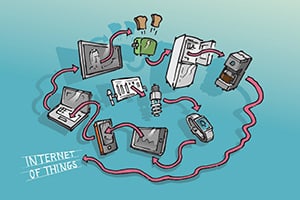
I will be chairing the panel on the Internet of Things: a Force for Good or Evil? at ITU Telecom World 2014 in Doha in December this year.
What is the Internet of Things? I would like to define it as anything that does not have a human involved. According to the GSM Association website we will have something approaching 5 billion connections by 2017, and the number of subscribers is increasing by over four times the amount of the population increase. Soon we will have reached the point where almost everybody has a mobile phone in the world, and has several devices that are also connected.
In order to expand and provide new services to the networks, the Internet of Things becomes increasingly important. So let us think about what might be involved in these things: we have smart energy, intelligent transport and cars, medical devices, fitness devices, even refrigerators and television sets. We may also wish to control our home devices, and of course there are safety benefits and energy saving devices that may also be introduced by the Internet of Things.
What other issues can we expect from the growing Internet of Things? Well, firstly we have standards: there are a number of national and international standards groups worldwide addressing its use, such as oneM2M, but there is also a large number of industry groups, which is creating a proliferation of standards that may be incompatible or do not include essential elements.
There are also of course issues around privacy and security. There are many examples in the hacker community where security failures can lead to the loss privacy, including webcams that are open to the Internet and can be viewed by anybody, television sets that reveal your viewing habits, medical devices that can be interfered with and have potentially serious consequences, and cars that can be opened and in some cases started and stopped. Some of these can cause disruption to national and international infrastructure, for example, a denial of service attack on the electricity system, food supplies or water.
As an individual you might be concerned that the fact that you were at home using electricity or devices may be revealed for a third party, as well as your driving habits, shopping baskets, and many other aspects of your life.
The panel will discuss many of these issues, and suggest ways in which they may be tackled and in some cases even put right. What is needed it is for manufacturers to think about the security and privacy issues, and the underlying technology being used, and use these principles to produce safe devices. There are many examples that are weak in the areas of security that have clearly missed out this essential stage of the development of the product or service.
There also needs to be a better understanding of the legal framework in which an individual may give up much of the data gathered by these means for his own benefit, and be able to control it.
I will be looking forward to an interesting panel discussion covering some and more of these topics.
